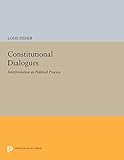Constitutional Dialogues : Interpretation as Political Process / Louis Fisher.
Material type: TextSeries: Princeton Legacy Library ; 922Publisher: Princeton, NJ : Princeton University Press, [2014]Copyright date: ©1988Edition: Course BookDescription: 1 online resource (318 p.)Content type:
TextSeries: Princeton Legacy Library ; 922Publisher: Princeton, NJ : Princeton University Press, [2014]Copyright date: ©1988Edition: Course BookDescription: 1 online resource (318 p.)Content type: - 9780691605197
- 9781400859573
- online - DeGruyter
- Issued also in print.
| Item type | Current library | Call number | URL | Status | Notes | Barcode | |
|---|---|---|---|---|---|---|---|
 eBook
eBook
|
Biblioteca "Angelicum" Pont. Univ. S.Tommaso d'Aquino Nuvola online | online - DeGruyter (Browse shelf(Opens below)) | Online access | Not for loan (Accesso limitato) | Accesso per gli utenti autorizzati / Access for authorized users | (dgr)9781400859573 |
Frontmatter -- Contents -- Acknowledgments -- Introduction -- 1. Public Law and Politics -- 2. The Doctrine of Judicial Review -- 3. Threshold Requirements: Husbanding Power and Prestige -- 4. Judicial Organization -- 5. Decisionmaking: Process and Strategy -- 6. Efforts to Curb the Court -- 7. Coordinate Construction -- Conclusion -- Suggested Readings -- Index of Cases -- General Index
restricted access online access with authorization star
http://purl.org/coar/access_right/c_16ec
Who makes constitutional law? Is constitutional doctrine the monopoly of the courts? In accessible and persuasive prose Louis Fisher explains that constitutional law is not solely or even primarily the Supreme Court's "final word" but rather a richly political convergence of separate interpretations. With a broad range of examples, he argues that constitutional principles emerge from a dialogue among all three branches of government--executive, legislative, and judicial. Important contributions also come from the states and the general public. Fisher identifies executive and legislative initiatives in many areas of constitutional significance. Where there is litigation, the Court generally upholds these initiatives or may avoid making a constitutional decision by using "threshold devices." On those rare occasions when the Supreme Court exercises judicial review and strikes down a presidential or congressional action, it is usually only a matter of time before the proposal is revived and the dialogue begins again.Originally published in 1988.The Princeton Legacy Library uses the latest print-on-demand technology to again make available previously out-of-print books from the distinguished backlist of Princeton University Press. These editions preserve the original texts of these important books while presenting them in durable paperback and hardcover editions. The goal of the Princeton Legacy Library is to vastly increase access to the rich scholarly heritage found in the thousands of books published by Princeton University Press since its founding in 1905.
Issued also in print.
Mode of access: Internet via World Wide Web.
In English.
Description based on online resource; title from PDF title page (publisher's Web site, viewed 30. Aug 2021)


